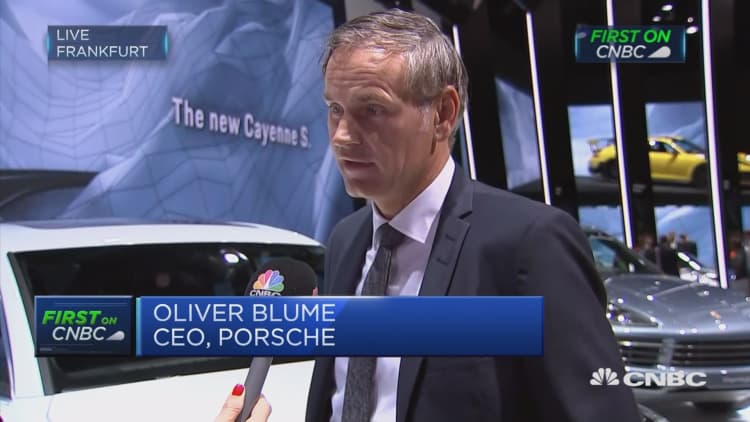Luxury Car Sales In China: Why BMW And Porsche Are Facing Headwinds

Table of Contents
Economic Slowdown and its Impact on Luxury Spending
China's economic growth has slowed in recent years, impacting high-end consumer spending significantly. Decreased consumer confidence, coupled with rising inflation and geopolitical uncertainties, has led to a decline in demand for luxury goods, including premium automobiles. Data from the National Bureau of Statistics of China shows a noticeable reduction in GDP growth, directly affecting disposable income among high-net-worth individuals.
- Reduced disposable income among high-net-worth individuals: The economic slowdown has impacted even the wealthiest consumers, leading to more cautious spending habits.
- Increased uncertainty about the future leading to delayed purchases: Economic instability encourages consumers to postpone non-essential purchases like luxury cars.
- Shift in spending priorities towards essential goods and services: Consumers are prioritizing essential goods and services, reducing their discretionary spending on luxury items.
This shift is reflected in various reports showing a decrease in luxury goods sales across the board, with the luxury car segment particularly affected. The previously robust growth trajectory of the Chinese luxury car market has plateaued, presenting a significant challenge for established brands like BMW and Porsche.
The Rise of Domestic Luxury Brands
The rise of Chinese luxury car brands is another crucial factor contributing to the headwinds faced by BMW and Porsche. Domestic brands like Hongqi, Nio, and Li Auto are increasingly competitive, leveraging several key advantages:
- Increased brand awareness and loyalty among Chinese consumers: National pride and a preference for homegrown brands are driving sales for domestic manufacturers.
- Competitive pricing strategies: Domestic brands often offer competitive pricing, making them a more attractive option for price-sensitive consumers.
- Superior understanding of local consumer needs: Domestic brands are better equipped to understand and cater to the specific needs and preferences of the Chinese market.
These brands are aggressively expanding their product lines and improving their brand image, successfully capturing market share from established international competitors. This intensified competition requires BMW and Porsche to adapt their strategies to maintain their position in the market.
Evolving Consumer Preferences and Technological Advancements
Consumer preferences are rapidly evolving, with a significant shift towards electric vehicles (EVs) and advanced technological features. The Chinese market is at the forefront of this trend, demanding vehicles with:
- Growing demand for electric and hybrid vehicles: China's commitment to reducing carbon emissions and promoting sustainable transportation is driving this demand.
- Increased preference for advanced driver-assistance systems (ADAS): Features like autonomous driving capabilities and advanced safety systems are highly sought after.
- Importance of connected car features and digital services: Consumers expect seamless integration with their smartphones and access to a wide range of digital services within their vehicles.
BMW and Porsche, while investing in electric vehicle technology, need to accelerate their efforts to meet the rapidly evolving demands of the Chinese market. Failing to adapt quickly to these technological advancements could further hinder their sales growth.
Government Regulations and Policies
The Chinese government's regulations and policies also play a significant role in shaping the luxury car market. Stringent environmental regulations, import tariffs, and data privacy laws present challenges for foreign brands.
- Stringent emission standards and carbon reduction targets: Meeting increasingly strict emission standards requires significant investment in research and development.
- Import tariffs and taxes: High import duties increase the cost of foreign-made vehicles, reducing their competitiveness compared to domestically produced cars.
- Regulations related to data privacy and cybersecurity: Navigating complex data privacy and cybersecurity regulations requires significant compliance efforts.
These regulatory hurdles necessitate a deep understanding of the Chinese regulatory landscape for foreign luxury car brands to successfully operate and compete in the market.
Conclusion: Navigating Headwinds in the Chinese Luxury Car Market
The challenges faced by BMW and Porsche in the Chinese luxury car market are multifaceted. The economic slowdown, the rise of domestic brands, evolving consumer preferences, and government regulations all contribute to the headwinds they are experiencing. While the Chinese luxury car market remains potentially lucrative, success requires adaptation, innovation, and a deep understanding of the local market dynamics. To gain a more comprehensive understanding of the challenges and opportunities in this sector, continue researching the dynamics of the Chinese luxury car market and explore further analysis of luxury car sales in China. You can find valuable insights through reports from organizations like the China Association of Automobile Manufacturers (CAAM) and market research firms specializing in the automotive industry.

Featured Posts
-
 Discover Dong Duong Hotel Hue A Fusion Hotel Experience
Apr 26, 2025
Discover Dong Duong Hotel Hue A Fusion Hotel Experience
Apr 26, 2025 -
 Mission Impossibles Ving Rhames Discusses His Original Fate And The Emotional Final Chapter
Apr 26, 2025
Mission Impossibles Ving Rhames Discusses His Original Fate And The Emotional Final Chapter
Apr 26, 2025 -
 Cnn Anchors Top Pick Exploring The Allure Of Florida
Apr 26, 2025
Cnn Anchors Top Pick Exploring The Allure Of Florida
Apr 26, 2025 -
 American Battleground A David Vs Goliath Fight For Justice
Apr 26, 2025
American Battleground A David Vs Goliath Fight For Justice
Apr 26, 2025 -
 Amanda Seyfrieds Raw Defense Of Nepotism In The Entertainment Industry
Apr 26, 2025
Amanda Seyfrieds Raw Defense Of Nepotism In The Entertainment Industry
Apr 26, 2025
Latest Posts
-
 Belinda Bencic Claims Abu Dhabi Open Title
Apr 27, 2025
Belinda Bencic Claims Abu Dhabi Open Title
Apr 27, 2025 -
 Abu Dhabi Open Bencics Dominant Win
Apr 27, 2025
Abu Dhabi Open Bencics Dominant Win
Apr 27, 2025 -
 Bencic Triumphs At The Abu Dhabi Open
Apr 27, 2025
Bencic Triumphs At The Abu Dhabi Open
Apr 27, 2025 -
 Bencics Stylish Abu Dhabi Open Victory
Apr 27, 2025
Bencics Stylish Abu Dhabi Open Victory
Apr 27, 2025 -
 Wta Abu Dhabi Bencics Triumphant Return To The Final
Apr 27, 2025
Wta Abu Dhabi Bencics Triumphant Return To The Final
Apr 27, 2025
